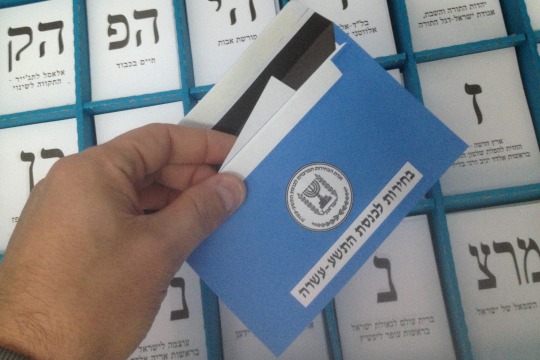‘I cast my first vote ever today. It was in the Israeli elections where one vote really makes a difference, and I truly cherished this moment.’
I’m in my mid-30s and I’m embarrassed to say I had never voted. For me, voting in the U.S. – where I spent much of my time – had sadly and frustratingly proven to be inconvenient and lacking of potential for impact. Make no mistake about it, I’m not an apathetic person and I treasure the value of the vote, especially after having seen first-hand, places where people don’t have it and what not having it actually means. So let me explain.
In the U.S., one is required to know in advance where one will be on election day, which as a traveling journalist – especially a journalist who usually worked on election day itself – wasn’t always possible. Hence, the inconvenience. Second, in the U.S., I had only ever been eligible to vote in two places: California and Washington, DC. California – even without my one vote – always went (and will continue to go) to the Democrats, thanks to the electoral college system that is based on a state-by-state winner-takes-all calculation. Thus, I could say with quite certainty that my one vote wouldn’t have changed the outcome. The same can be said about Washington, DC, a non-state district that lacks voting rights in the U.S. Congress but is still allocated an electoral college vote. Washingtonians vote for Democratic candidates by a whopping 20:1 margin. Again, my vote would not have changed much.
That said, on Tuesday, January 22, 2013, I cast my first vote ever. It was in the Israeli elections. It’s a country-wide vote without district representation. One vote really makes a difference and I truly cherished this moment.
But in the days leading to the vote, I had been unsure for whom – or for which party – to cast my ballot.
In the U.S., I and others often mock the undecided voter. He or she is usually wooed by Republicans and Democrats all trying to get these kingmakers to put them over the top, most notably in so-called “swing states,” where those votes can make or break a candidate. A comedy sketch show, days ahead of the last American election, even mocked them in a skit. “Who are these undecided voters?” the sketch pondered. “We went out to find them.” Then you see “Molly” sitting at a dinner table, bug-eyed and confused. “I just don’t know if to use the big fork? Or the little fork?” Molly asks. The joke, I guess, was that undecided voters are by nature undecided people. But that’s not me. I’m a very decisive person. You ask me, “1 or 2?” I pick 1. Brown or Blue? I pick blue. But give me dozens of parties to choose from and it becomes a little more overwhelming.
Like everything itself in Israel, it seemed that voting requires active participation, strategy and tactical maneuvering. So I had to consider a few options:
Would I vote my conscience, for a party that shares my values at its core? Or, would I vote for the party that I think should lead the government? Or, would I vote for a party that I think has the best chance to pull the coalition as close as possible to my views? (Some people don’t like voting for the opposition, my genius brother pointed out to me. They like voting for the government. So, if they are a politically left-leaning voter, they calculate which party – among those likely be in the coalition – can best pull the coalition to the “left,” and they vote in the hopes of trying to strengthen that party.)

The process itself proved exhausting, and I had been going back and forth for weeks.
And then it hit me…
In the last few days, I read about a small, online campaign encouraging Israeli voters to give their vote to a Palestinian who can’t vote. The idea was that Palestinians in Gaza and the West Bank who – vis-à-vis the occupation – are directly affected by the results of the Israeli elections, but who don’t have Israeli citizenship and thus don’t have the right to vote, would get a chance to do so. There is indeed a lot one could do with one’s vote, and transferring it appears to be just as powerful of a statement as picking someone on the ballot. So the initiative could be described as activist altruism.
In truth, I found it admirable. But I wasn’t prepared to give away my vote – my first vote – to a Palestinian. As a believer in the two-state solution, the end-goal as I see it is to have Palestinians vote in their own state, and that’s the aim toward which I will work. But it lead me to my own initiative.
I decided to give my vote to an Israeli abroad. Someone who loves this country. Someone who bleeds blue and white. Someone who has risked his life defending the only home he knows. Someone who follows the country’s daily joys and struggles. Someone who cries its tears from a distance. Someone who has read everything about this election inside-and-out. Someone with whom I have frequently argued politics. Someone who is clearly affected by the outcome. Someone who is aching to vote … but isn’t here.
As an Israeli abroad, he can’t vote. But as a citizen of Israel, he has the right to. So this time, he will.
A vote is a statement, and this is mine.
You know who you are. I know who you want. And this vote – my vote, my first vote – was yours.


